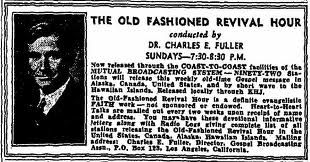So far in the series, we have examined an Episcopal seminary, Virginia Theological Seminary and Wisconsin Lutheran Seminary.
 Today, we look at an Evangelical institution,Fuller Theological Seminary, which has influenced not only non-denominational churches but aspects of mainline Protestantism as well.
Today, we look at an Evangelical institution,Fuller Theological Seminary, which has influenced not only non-denominational churches but aspects of mainline Protestantism as well.Fuller’s main campus is located in Pasadena, California. Undoubtedly, its location makes it a magnet for seminary students from all over the world who wish to study near iconic Los Angeles. For Americans who wish to stay closer to home, Fuller has regional campuses in several other locations in the western US and Texas.
Charles E Fuller (1887-1968) was a native of Los Angeles and spent his life in southern California. He was a graduate of Pomona College then worked in the fruit packing industry. He then attended the Bible Institute of Los Angeles (now known by its acronym, Biola) and dedicated his life to the ministry. He rejected Presbyterianism as did Charles Taze Russell, founder of the Jehovah’s Witnesses. Fuller became a Baptist minister in 1925. In 1937, he began his 30-year radio ministry, The Old Fashioned Revival Hour, on the Mutual Broadcasting System initially, followed by the ABC Radio Network. It was broadcast nationwide. Jack Chick, of the cartoon Gospel tracts, says he was saved while he was listening to the programme in 1948.
The previous year, Fuller had founded his eponymous seminary in partnership with Harold Ockenga, who was the pastor of Park Street Church in Boston, Massachusetts. His dream was to make it a ‘Caltech of the evangelical world’. The idea was to reform American fundamentalism, turning it into what became known as neo-fundamentalism in the 1950s.
Today, its famous alumni include Rick (The Purpose-Driven Life) Warren, Rob (Sex God) Bell, John (The Me I Want to Be) Ortberg, Robert A Schuller (son of the Crystal Cathedral founder) and Bill Bright (founder of Campus Crusade for Christ). The seminary is now known for advancing the emergent church, missiology, spiritual formation and the church growth movement. These affect Lutheran, Anglican and Calvinist churches alike.
Past faculty members whose names you might recognise include C Peter Wagner (church growth proponent), Richard J Foster (Quaker mystic) and John Wimber (founder of the charismatic Vineyard Movement and former director of the Charles E Fuller Institute of Evangelism and Church Growth).
Faculty come from all continents and denominations. Richard J Mouw has served as Fuller’s President since 1993. He is also Professor of Christian Philosophy. Coming from a Reformed background, he has a particular interest in the Calvinist concept of common grace (a providential modicum of goodness in mankind which holds society together). He is also committed to social justice and ecumenism.
Overall impression of Fuller Theological Seminary: Be careful out there. Between church growth, the emergents, the missiological, the ecumenists and the mystics, these guys have a lot of influence. Their charm attracts fans from outside the evangelical world and could well be coming to a church near you, if not already. There is no doubt that Fuller prepares its students well. Too well, perhaps. Too many people from mainstream denominations have been taken in by honeyed words, new concepts and practices that go beyond or against what Scripture says. I would be surprised if today’s Fuller is quite what its founder had in mind.
Verdict: Be Berean and test against the Bible — your soul might be at risk.
Women candidates for ordination: Yes
Pietism / Healthism index: Nothing about tobacco but a bit of a lecture aboutalcohol
